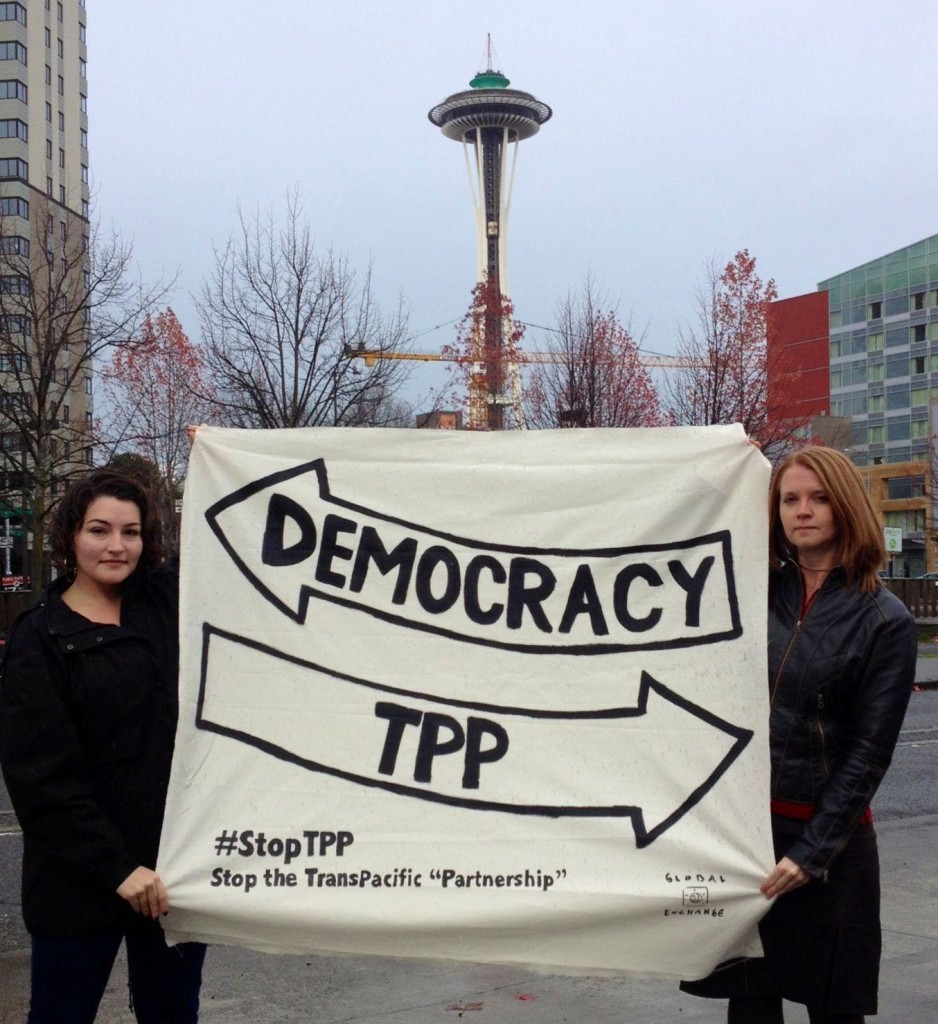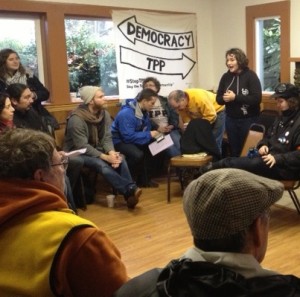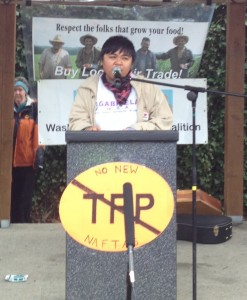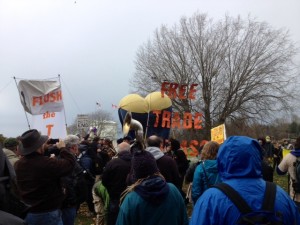
Exactly 13 years after the #N30 actions to shut down the WTO, Global Exchange returns to Seattle with a similar message: #StopTPP!
We all know free trade agreements are politically, economically, and environmentally harmful.
But this weekend at TPPxBorder, hearing people speak to the real consequences of these deals brought my understanding of the dangers of these Free Trade Agreements (FTAs) to a very human scale.
Listening to the voices of people who are affected by these FTAs – a pulp mill worker from Everett, WA, who got laid off two years before pension, HIV positive people who won’t be able to afford life-saving medication because of patent laws that protect profits instead of access, a Philippine woman who was forced to leave her family in search of work – these voices remind me that free trade isn’t just an ‘issue’ to discuss or debate. Free trade is about about profits at the expense of people’s health and safely. About trade over ethics. About politics over people and planet.
 Free trade ‘agreements’ are anything but consensual.
Free trade ‘agreements’ are anything but consensual.
In fact, the only partnering happening in the TransPacific ‘Partnership’ is is the stitching together of the 1%- corporations and politicians- whilst the entirety of civil society is excluded and ignored… for now.
That’s why on Saturday December 1, a crowd of hundreds gathered at the U.S.-Canada border to demonstrate our unity and solidarity against the TransPacific Partnership. Representatives from four of the 13 negotiating countries – along with New Zealand by phone – spoke of the risks that the TPP presents to their communities, and the powerful international unity being built to stand up and protect our dignity, our planet, and our human rights.
We called this one TPPxBorder: The People’s Round. What I loved about this rally wasn’t only the fiery speakers, the diversity, the music, the unity, the hot coffee, and the ultra-legitimacy of our opposition to this heinous version of the TPP…. what I loved was learning about what an alternative deal would look like- one by and for the people. Listening to speakers and experts articulately describe what fair trade looks like, what it offers communities internationally, reminds me why these fights are so important, and the promise of real, practical, and respectful trade solutions. We have answers – now is the time to join hands and fight for them.
After our rally, and piñata action (in which people managed to overcome ‘blindfolds’ of corporate greenwashing and lobbyist money to finally destroy the TPP piñata and release the affordable jellybean ‘medicines’ and GMO-free popcorn trapped inside!) we headed indoors to a warm meal and strategy sessions to plan future action.

Global Exchange & Witness for Peace co-led a “Social Media to #StopTPP” breakout group to discuss “Twitterstorming” the corporations secretly negotiating TPP.
The breakout group I co-lead was about how we can use social media to #StopTPP. Our strategy is to call out the corporations negotiating the TPP in secret… and put their secrets in public view on social media channels. This week, our coalition members are calling out two corporate interests a day on their ties to the TPP… would you like to join the Twitterstorm? Just follow @GlobalExchange and @ElectDemocracy on Twitter, then retweet our actions every day this week at 11am and 2pmPST to help spread the word about #StopTPP using the very follower lists that these corporations have built. We can use your help and you can participate from anywhere.
The TransPacific Partnership is on a 1%-gilded beltway and it’s moving fast. But there is time (and enough of us) to stop it. The first thing we all can do is help spread the word. None of us can afford another NAFTA. Help us get the last 250,000 signatures needed this year to reach 1 million on the Avaaz petition against the TPP! And ask your organization to sign the Unity Statement.
VIDEO: Unity Statement at TPPxBorder Rally Dec. 1, 2012
For more information about the TransPacific Partnership and what you can do to stop it, see “10 Reasons to Oppose the TPP.” Thank you for supporting Fair Trade this holiday season, and telling corporations negotiating the TPP in secret exactly what you think of them. Together, we can #StopTPP.


